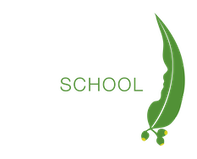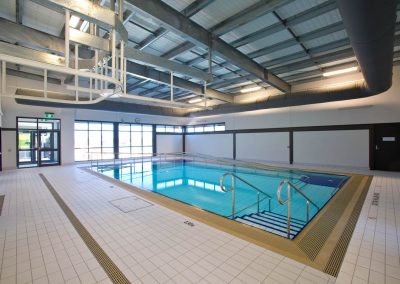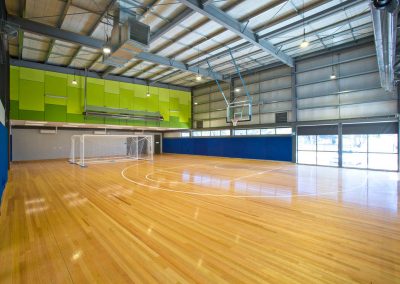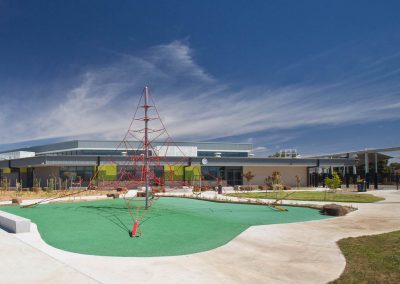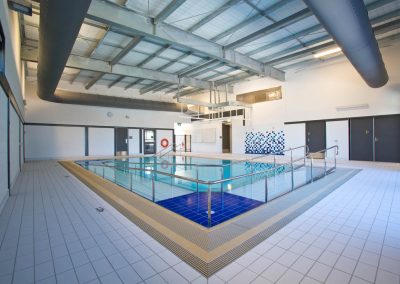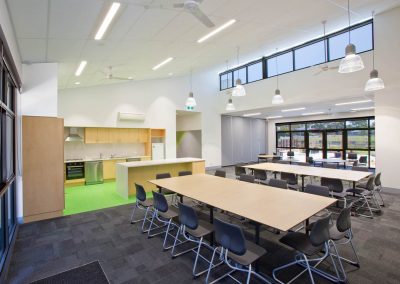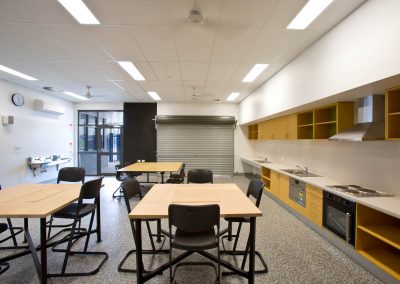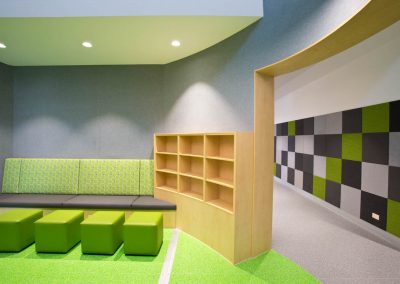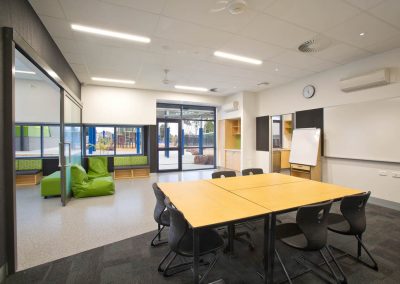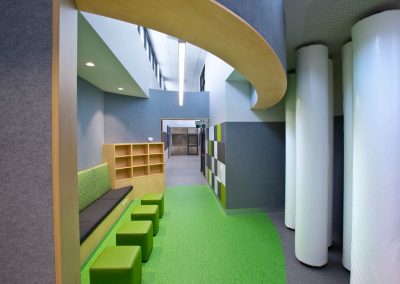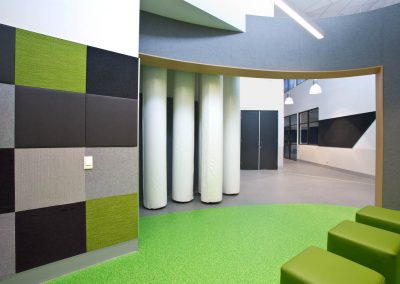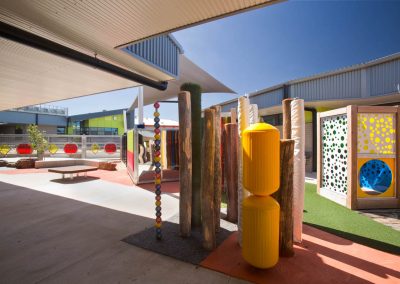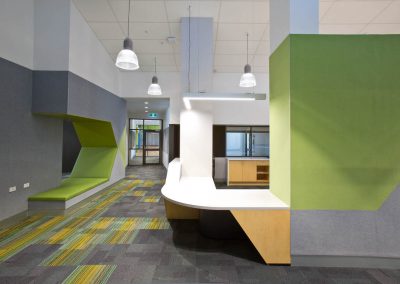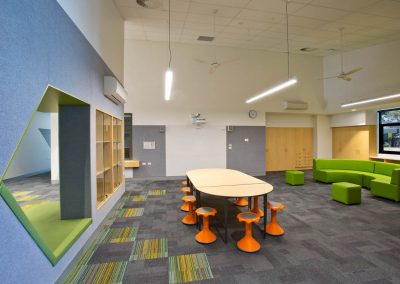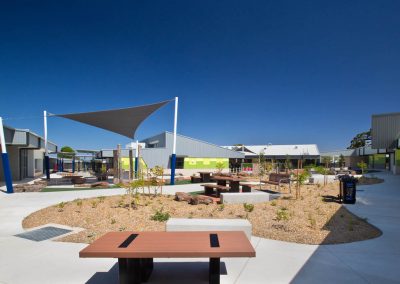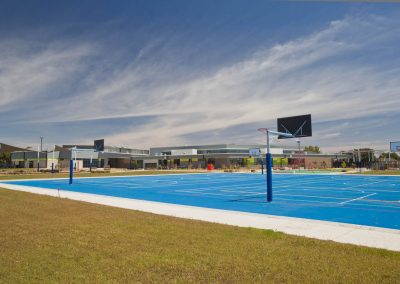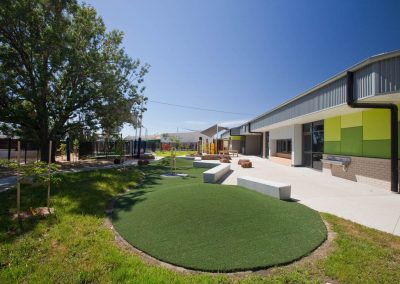Our Students
Child Safe Standards
What are the Standards?
The Child Safe Standards (the Standards) are compulsory minimum standards for all Victorian schools to ensure they are well prepared to keep children and young people safe and protect them from abuse. Ministerial Order 1359 – Implementing the Child Safe Standards – Managing the risk of child abuse in schools provides the framework for child safety in schools.
The Child Safe Standards include requirements to keep children, young people and students safe, including:
- involvement of families and students in child safety
- schools’ focus on safety for Aboriginal students
- better management of child abuse risks in online environments
- governance, systems and processes for keeping students safe.
The Victorian Registration and Qualifications Authority is responsible for regulating the compliance of schools with the Standards. Schools are required to comply with the Standards as part of the prescribed minimum standards for registration.
There are 11 Child Safe Standards:
- Standard 1: Culturally safe environments – Establish a culturally safe environment in which the diverse and unique identities and experiences of Aboriginal children and young people are respected and valued.
- Standard 2: Leadership, governance and culture – Ensure that child safety and wellbeing are embedded in school leadership, governance and culture.
- Standard 3: Child and student empowerment – Children and young people are empowered about their rights, participate in decisions affecting them and are taken seriously.
- Standard 4: Family engagement – Families and communities are informed and involved in promoting child safety and wellbeing.
- Standard 5: Diversity and equity – Equity is upheld and diverse needs are respected in policy and practice.
- Standard 6: Suitable staff and volunteers – People working with children and young people are suitable and supported to reflect child safety and wellbeing values in practice.
- Standard 7: Child-focused complaints processes – Ensure that processes for complaints and concerns are child focused.
- Standard 8: Child safety knowledge, skills and awareness – Staff and volunteers are equipped with the knowledge, skills and awareness to keep children and young people safe through ongoing education and training.
- Standard 9: Physical and online environments – Physical and online environments promote safety and wellbeing while minimising the opportunity for children and young people to be harmed.
- Standard 10: Review of child safety practices – Implementation of the Child Safe Standards is regularly reviewed and improved.
- Standard 11: Implementation of child safety practices – Policies and procedures that document how schools are safe for children, young people and students.
Hamlyn Views School is committed to the safety and wellbeing of all children and young people and have zero tolerance for any form of child abuse. We implement the Child Safe Standards to ensure the safety and well-being of all students and promote an organisational culture that manages the risk of child abuse, harm or neglect. We believe that the Standards strengthen our existing practices to prevent and respond to child abuse while maintaining consistency in how we manage any potential concerns in our school.
Hamlyn Views School Child Safety Policies
Our child safety and wellbeing policies outline the measures and strategies we have in place to support, promote and maintain the safety and wellbeing of our students:
- HVS Child Safe Commitment Statement
- HVS Child Safety Policy 2022
- HVS Child Safety Code Of Conduct 2022
- HVS Child Safety Responding And Reporting Obligations Policy And Procedures
Further policies that support child safety and wellbeing and more are found on the School Website https://hamlynviews.vic.edu.au/our-school/#policies.
- Complaints Policy
- Student Wellbeing and Engagement Policy
- Bullying Prevention Policy
- Volunteers Policy
- Visitors Policy
- Digital Learning Policy
As valuable partners in promoting and maintaining child safety and wellbeing at Hamlyn Views School we welcome and encourage your feedback.
If you have any suggestions, comments or questions in relation to our child safe policies and practices, please contact Tania Robertson, Assistant Principal.
Resources:
- Protecting Children From Abuse: For Parents and Carers
- Child Safety Tipsheet For Parents: Teach Your Child How To Keep Themselves Safe
- Child Protection and Child Safe Standards (PROTECT) https://www.education.vic.gov.au/school/teachers/health/childprotection/Pages/default.aspx
For more information about the Child Safe Standards at Hamlyn Views School please contact our Child Safety Champion: Assistant Principal Tania Robertson Ph: (03) 52155700
Book a tour
All prospective students and parents are encouraged to attend a tour of Hamlyn Views.
School tours are an excellent way for prospective students and parents to see the school and to experience the unique classroom environment that makes learning at Hamlyn Views such an enriching and stimulating experience catered for all students.
For all enquiries, and to learn more about the school, please contact us.
Email: hamlyn.views.school@education.vic.gov.au
Phone: 03 5215 5700
Enrolment
The Enrolment Requirements and Process
To be eligible to enrol at Hamlyn Views School (a Special Developmental School) students must meet specific enrolment criteria. This includes:
- Diagnosis of a Moderate to Profound Intellectual Disability (Under 50FSIQ)
- Eligible for Program for Disability Inclusion Profile (DIP) funding
- Being at least 5 years of age by 30 April of the year of enrolment.
Specialist schools do not have enrolment zones but they do have designated transport areas.
Documents required:
- Birth certificate
- Immunisation History Statement from Australian Immunisation Register (only acceptable evidence)
- Verification of changes to student enrolment names
At initial enrolment a Victorian Student Number (VSN) will be allocated in the name certified in admission documents.
To learn more about our school we offer regular school tours, provide information sessions across the year, and book meetings with families as required to discuss student enrolments.
For more information about enrolling your child at our school please contact Sam Simpkin, Leading Teacher.
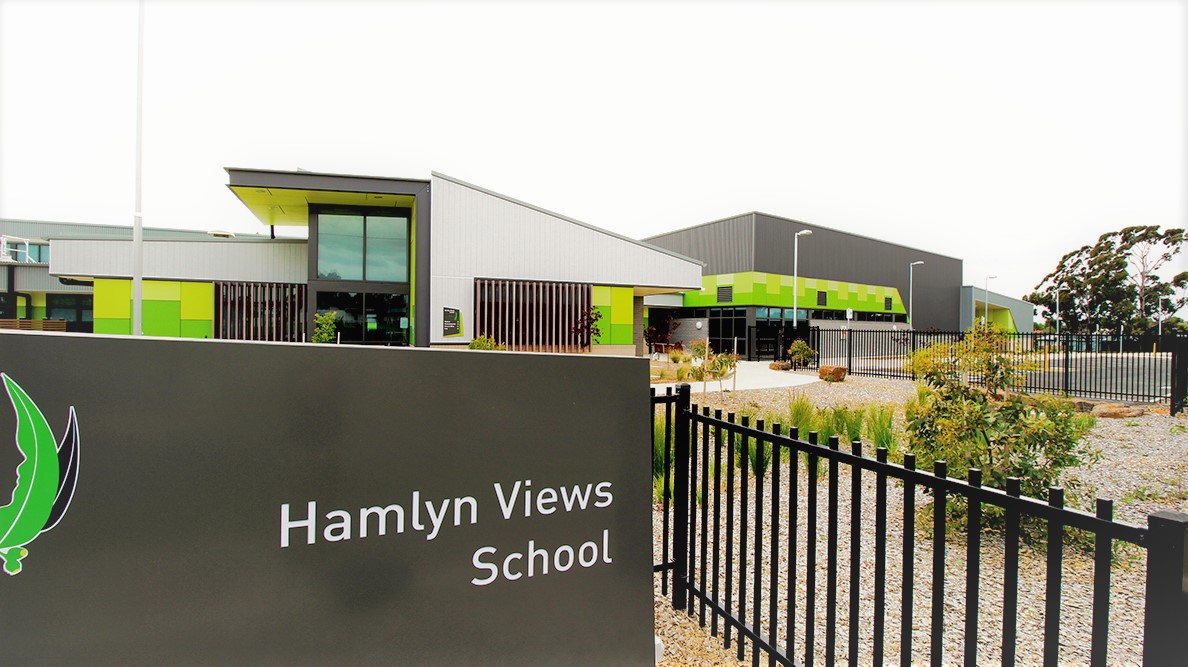
Bus Transport
Student Transport
The Students with Disabilities Transport Program (SDTP) provides transport assistance for eligible students attending their designated Government Specialist School. The program is a contribution towards, and an acknowledgement of, the additional costs families may incur as a result of attending a specialist school.
However, attendance at a Specialist School does not automatically entitle a student to assistance or preclude parents/guardians from being primarily responsible for their child’s transport arrangements. Student transport is in scope of the National Disability Insurance Scheme (NDIS). Until 2023 Student Transport will be provided by the Victorian Government as an in-kind service.
Students at Hamlyn Views School may get help with travel through the SDTP including:
- access to a specialist school transport service
- a conveyance allowance (a financial contribution towards the cost of travel)
- access to a travel education program
- an alternative transport solution arranged by the Department.
Our school can discuss with families:
- the different types of travel help available
- the responsibilities that go with accepting travel help
- pick-up and drop-off locations and times
- any behavioural or medical needs a student has while on the transport service.
To access transport help a student must:
- meet the criteria for the Program for students with disabilities
- live in the designated transport area of Hamlyn Views School
- be enrolled at the school for three or more days each week
- be of school age and live in Victoria.
- HVS Student Bus Transport Code Of Conduct 2021
- HVS Bus Management Policy 2021
- HVS Bus Management Processes 2021
- HVS Bus Emergency Checklist
More information about student transport at our school contact the office and speak to the Transport Coordinator.
School-Wide Positive Behaviour Support
SWPBS stands for School-Wide Positive Behaviour Support. Teaching, modelling and reinforcing positive social behaviour is an important part of a student’s educational experience at Hamlyn Views School, and SWPBS aides the provision a positive climate for learning, where students are clear on what is expected of them, and are settled, engaged and ready to learn.
Key components of SWPBS are:
- A common approach
- Consistency of language
- A matrix of positively stated expectations
- Explicit teaching of expectations
- Regular and frequent opportunities to practice expected behaviours
- Incentive/rewards for meeting behavioural and learning expectations
We celebrate even the smallest of success and acknowledge the effort of our students in the following ways:
In the classroom/playground
- Immediate reward: such as positive praise, celebration in class discussion, choosing a preferred activity
- Incentive charts: students can earn Monty Money to work toward an agreed reward
- End of term celebrations
Whole school
- Weekly Values Heroes awards given out at assembly
- Students can choose to help out in buddy classrooms as a reward
Restraint and Seclusion of students must only be used as a last resort in an emergency where there is an imminent threat of physical harm or danger to the student or others and should not form part of a behaviour management strategy or support plan for a student.
Every instance of physical restraint or seclusion must be reported to the Department of Educations’ Incident Support and Operation Centre (ISOC).
Prone restraint (holding a student face down) and supine restraint (holding a student face up) is not permitted within Victorian government schools.
Every instance of physical restraint or seclusion has the potential to place the student and staff member in a harmful situation, which can include injury and death. In every instance of physical restraint, breathing must be visually monitored. Every instance of seclusion must be visually monitored throughout the incident by a staff member to ensure that the seclusion is justified, time limited and that the student, and other students and staff are safe.
Restraint or seclusion must not be used except in situations where:
- Student behaviour poses an imminent threat of physical harm or danger to self or others
- Such action (i.e. to physically restrain or seclude) would be considered reasonable in all the circumstances
- There is no less restrictive means of responding in the circumstances.
- Restraint or seclusion should be discontinued as soon as the immediate danger has dissipated (Regulation 25 (Restraint from danger) of the Education and Training Reform Regulations 2017.
- For more information, refer to https://www2.education.vic.gov.au/pal/restraint-seclusion/policy

Rani Respect Sasha Safe Lenny Learner

Monty
The Monty Shop
To celebrate our success, we also have the Monty Shop – where students can redeem the Monty money that the have earnt for a range of rewards and prizes. The Monty Shop also provides our senior students with an opportunity to practice their money handling and work-related skills.

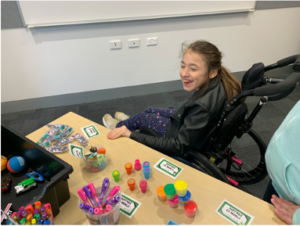
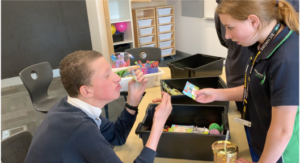
Statement of Purpose:
At Hamlyn Views School we work with families to positively teach expected behaviour at school, home and in the community, supporting our students to face the future together. We value respect, safety and learning.

A key feature of SWPBS is the explicit teaching of expectations. Doing so, supports our students to know what it is that will make them successful learners, and to to be able to develop positive social relationships with peers and adults. Being clear on expectations, and re-teaching skills throughout the year, supports them to feel clam, safe and comfortable in knowing what they need to do next, as well as supporting their everyday independence.

Allied Health
At Hamlyn Views School we have a range of different Therapists that make up our Allied Health Team. With two full time Allied Health Assistants, and Occupational Therapist, Speech Therapist and two part time Physiotherapists, all aspects of Therapy are covered for our students.
Occupational Therapy aims to help our students develop independence with activities through their day. This is done by breaking down specific activities into parts and helping develop skills to increase their ability to do them. Developing a student’s fine and gross motor skills, executive skills such as organisation, timing or checking, regulation and the ability to remain calm when this is needed, sensory such as fixing gaze on an object being used, or adapting their environment can help toward improvement. With development, students can learn to partake more successfully in learning including academic skills, social skills, play, fine motor skills such as use of art materials, gross motor skills such as transferring onto a swing safely, self care such as using the toilet, domestic skills such as learning to wash clothes, and skills for the community. At school, it aims to enhance each student’s ability to partake in the curriculum as much as possible.
Physiotherapy focuses on the way students move their bodies throughout the school day and their participation in physical activities. The provision of evidence-based physiotherapy ensures that all students can access and engage with the school curriculum to the best of their ability.
Speech Pathology looks at supporting students’ communication needs and their safety at mealtimes. Some students at Hamlyn Views School may require support and modification to their meals, to ensure their safety and reduce their risk of choking or aspirating on food, which is managed by the speech pathologist.
The speech pathologist also works on the development of a students’ use of and understanding of language. At Hamlyn Views this is often supported through the use of Alternative and Augmentative Communication (AAC). The speech pathologist supports students to engage in learning using both low tech and high tech AAC devices, this includes a range of communication apps and devices, such as: LAMP, PODD, Proloquo2go, and TD Snap. Students engage with their AAC in a variety of methods including iPad based apps, dedicated high tech devices, eye gaze, and neuronode. Speech pathologists will also support with development of literacy, play and social skills.
The Allied Health Assistant role is to support the Physiotherapist, Speech Therapist and Occupational Therapist to carry out all therapy programs for students at Hamlyn Views School.
Music Therapy
Music therapy is a research based practice in which music is used to actively support people as they strive to improve their health, communication and well-being.
In special education Music Therapists work with children to help them meet educational goals, at the same time offering an alternative to traditional teaching methods. While the aim of music education is to achieve music related outcomes for the students, Music Therapists use music primarily to achieve non-music goals. This includes increasing opportunities for cognitive and sensory stimulation, providing an outlet for a child’s emotional expression, enhancing self-confidence and fostering children’s social interaction and communication.
The techniques used by Music Therapists include song writing, movement to music, singing, improvisation, playing instruments, listening to recorded music and educational songs.
At Hamlyn Views School, the program includes group music therapy with the Foundation and Early, and Upper Primary students, a Junior and Senior Secondary choir and band, as well as individual sessions for some students. The program is run by an experienced Registered Music Therapist along with Masters of Music Therapy students on placement in partnership with the University of Melbourne.
Engagement & Wellbeing
TBC
Transition
The Foundation Year is designed to provide children with a solid base to the early years of education. Our highly skilled and dedicated team of Classroom Teachers, Education Support staff, Allied Health team and Inclusion Coordinators work closely together to support students to have a positive transition to their schooling life, and begin to learn the daily routines and expectations. The environment is adapted to meet students’ needs – it is a structured, calm, safe and secure space which provides opportunities to learn, explore, play and socialise.
Foundation provides the basis for your child’s success at school by developing:
- positive relationships with others
- a positive approach to learning
- an understanding of the three school expectations of ‘We keep safe’, ‘We show respect’ and ‘We are learners’.
- independence and confidence
- thinking and problem-solving skills
- communication skills
Foundation students will be engaged in learning which is aligned to the Victorian Curriculum and will take part in daily English and Mathematics programs which are differentiated to suit their needs. These programs incorporate the Personal and Social Capabilities and ICT, including iPads. We also teach an Integrated Unit of work which encompasses other areas of the curriculum e.g. History, Geography or Science. The Foundation teachers and Education Support staff will also work diligently with you to support your child to promote self-care skills and to build on their independence.
Our weekly Specialist programs include;
- Visual Arts
- Physical Education
- Performing Arts
It is our aim at Hamlyn Views School to assist every child to make the transition into school a positive and happy experience. Our routines will be simple and consistent until children feel confident and settled in the school environment. Our transition program will help your child become familiar with new teachers, new environments and new classmates.
Starting school for the first time can sometimes cause anxiety for young children. Fear of the unknown and nervousness about change can cause some anxiety as the first day of school approaches. Parents can help to empower their child to be confident and in control.
